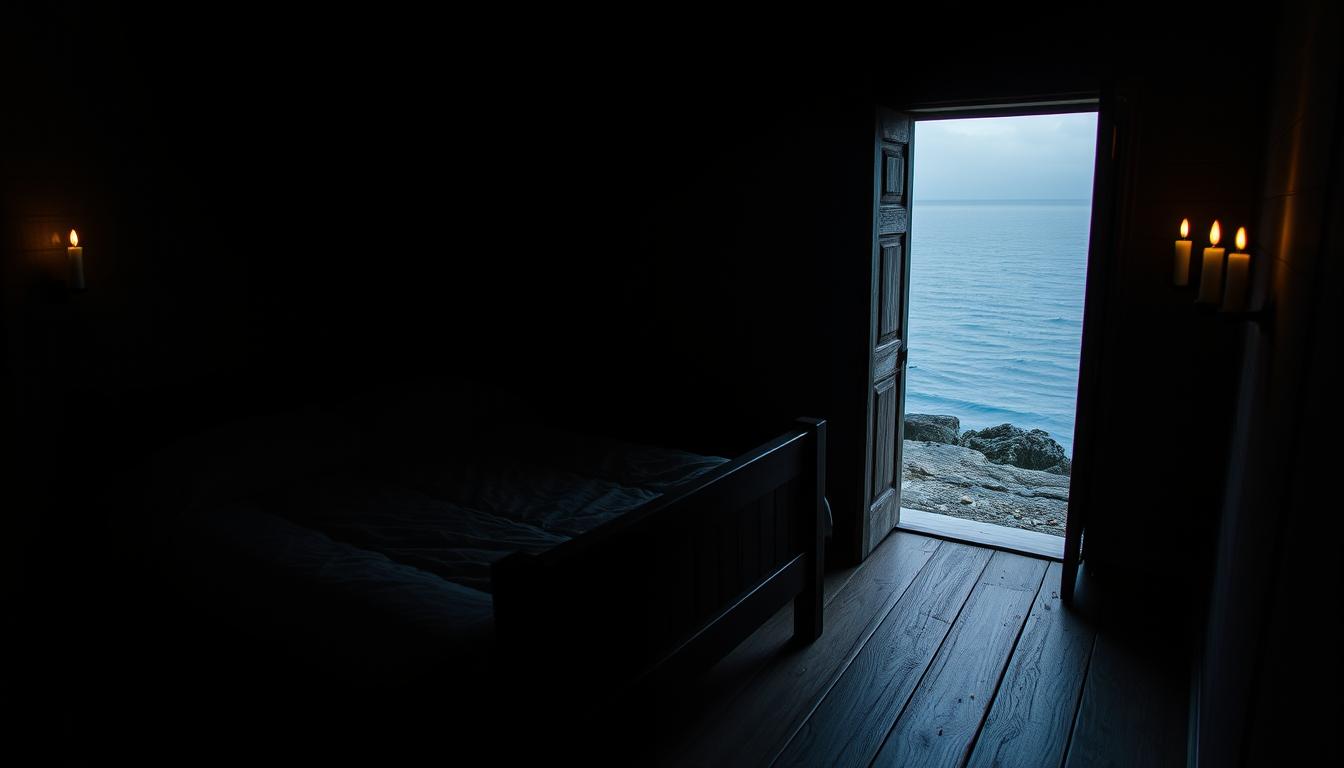Napoleon Bonaparte’s life was marked by conquest and power, but his final years were spent in exile, leading many to wonder how did Napoleon die. The circumstances surrounding Napoleon Bonaparte death have been the subject of much speculation and debate. As one of history’s most influential leaders, his demise had a profound impact on European politics and society.
Understanding the events that led to his downfall and ultimately, his death, is crucial to grasping the significance of his legacy. The question of how did Napoleon die is complex, with various factors contributing to his decline. Napoleon Bonaparte death marked the end of an era, and its effects were felt across the continent.
Key Takeaways
- Napoleon Bonaparte’s final years were spent in exile, leading to his eventual death.
- The circumstances surrounding his death have been the subject of much speculation and debate.
- His demise had a profound impact on European politics and society.
- Understanding the events that led to his downfall is crucial to grasping the significance of his legacy.
- Napoleon Bonaparte death marked the end of an era, and its effects were felt across the continent.
- The question of how did Napoleon die is complex, with various factors contributing to his decline.
- Napoleon Bonaparte death remains a topic of interest and study among historians and scholars.
The Final Chapter of Napoleon’s Life
After his decisive defeat at Waterloo in 1815, Napoleon Bonaparte’s fate was sealed. The battle marked the end of his reign and led to his eventual exile.
The Defeat at Waterloo
The Battle of Waterloo was a turning point that resulted in Napoleon’s surrender to the British forces. This loss significantly contributed to the napoleon bonaparte demise.
The Journey to Saint Helena
Following his defeat, Napoleon was transported to the remote island of Saint Helena in the South Atlantic. This isolation was intended to prevent any future attempts at reclaiming power.
Life in Exile
Life in exile was challenging for Napoleon. He maintained a strict daily routine, accompanied by loyal servants and a few close companions. Despite his circumstances, he strove to preserve his imperial dignity, reflecting on his legacy and pondering how napoleon passed away.
Napoleon’s Last Residence: Longwood House
After his defeat, Napoleon was exiled to Saint Helena, where he took residence in Longwood House. This modest dwelling was the emperor’s final abode, marked by its cramped and damp interiors.
The layout of Longwood House was far from comfortable. Poor ventilation and constant moisture made the environment unhealthy, contributing to Napoleon’s deteriorating well-being. These harsh living conditions have led historians to ponder the cause of Napoleon’s death.
The persistent dampness and inadequate maintenance of the residence likely weakened his health over time. Such factors raise the question: what exactly did Napoleon die of? Understanding the state of Longwood House provides crucial context in exploring napoleon died of what and the broader circumstances surrounding his demise.
The Emperor’s Declining Health
During his exile on Saint Helena, Napoleon’s health began to noticeably decline. He experienced a range of symptoms that indicated his condition was worsening over time.
Early Symptoms and Deterioration
Napoleon initially suffered from severe stomach pains and chronic headaches. These early signs suggested a serious underlying health issue, contributing to the question of how did Napoleon die.
Medical Care on Saint Helena
The medical care available to Napoleon on Saint Helena was limited. His doctors provided treatments based on the knowledge of the time, but the lack of advanced medical facilities may have hindered effective care.
The Role of Climate and Living Conditions
The harsh climate and isolation of Saint Helena likely exacerbated Napoleon’s health problems. The cold, damp environment was not conducive to his recovery, raising further questions about the napoleon death reason.
How Did Napoleon Die? The Medical Evidence
Understanding how did Napoleon die involves examining both historical records and modern medical analysis. In his final months, Napoleon experienced severe abdominal pain, persistent vomiting, and high fever. These symptoms were meticulously recorded by his attending physicians on Saint Helena.

The official diagnosis at the time attributed the cause of Napoleon’s death to gastric cancer. This conclusion was based on autopsy reports that revealed a stomach ulcer and other related issues. However, some experts suggest that the harsh living conditions on the island may have exacerbated his health problems.
- Abdominal pain
- Vomiting
- Fever
Modern researchers have re-evaluated these findings, considering factors such as possible arsenic poisoning and the impact of his exile environment. Despite these theories, the consensus remains that gastric cancer was the primary cause of his demise.
| Symptom | Description |
|---|---|
| Abdominal Pain | Constant and severe, indicating possible internal issues. |
| Vomiting | Frequent episodes that weakened his overall condition. |
| Fever | High temperatures suggesting infection or inflammation. |
The Final Days of Napoleon Bonaparte
Napoleon Bonaparte’s final days were marked by reflection and declining health. As his strength waned, he remained mentally sharp, contemplating his legacy and the future of Europe.
His Last Words and Actions
In his last moments, Napoleon expressed his enduring concern for France. He reportedly said, “France, the army, the head of the army, Joséphine.” His actions were calm, showing no signs of fear despite his deteriorating condition.
Those Present at His Death
Several close confidants and loyal servants were by his side when Napoleon passed away. Among them were his physician, Dr. Francesco Antommarchi, and General Joachim Murat. Their presence provided comfort during his final hours.
The Date and Time of Death
Napoleon Bonaparte death occurred on May 5, 1821. He passed away at approximately 5:09 PM at Longwood House on the island of Saint Helena. His demise marked the end of an era in European history.
| Detail | Information |
|---|---|
| Date of Death | May 5, 1821 |
| Time of Death | 5:09 PM |
| Location | Longwood House, Saint Helena |
| Present Individuals | Dr. Francesco Antommarchi, General Joachim Murat, Loyal Servants |
The Official Cause of Death
Many wonder, napoleon died of what, and the answer lies in the official records. Napoleon’s physicians diagnosed him with gastric cancer, a condition that had been worsening over time.
The symptoms included severe stomach pain, loss of appetite, and significant weight loss. These signs led the medical team to conclude that cancer was the primary cause of his decline. His closest companions accepted this diagnosis, believing it to be the true napoleon death reason.
However, over the years, historians have debated the official cause. Some suggest that environmental factors or even poisoning could have played a role. Despite these alternative theories, gastric cancer remains the most widely recognized explanation for Napoleon’s death.
Alternative Theories About Napoleon’s Death
While the official cause of Napoleon’s death points to stomach cancer, several alternative theories have emerged over the years regarding how did Napoleon die.
The Arsenic Poisoning Theory
One prominent theory suggests that arsenic poisoning played a role in the cause of Napoleon’s death. This idea originated from hair samples that showed elevated arsenic levels. Proponents argue that environmental exposure or deliberate poisoning could have contributed to his declining health.
Political Assassination Claims
Another theory claims that Napoleon was the victim of a political assassination. Supporters of this claim believe that rivals may have orchestrated his death to eliminate a powerful leader. Despite these claims, there is limited concrete evidence to support the notion of a deliberate assassination.
| Theory | Evidence | Historical Reception |
|---|---|---|
| Arsenic Poisoning | High arsenic levels in hair samples | Debated among scientists and historians |
| Political Assassination | Lack of direct evidence | Widely considered speculative |
The Impact of Napoleon’s Death on Europe
The demise of Napoleon Bonaparte marked a turning point for Europe, reshaping its political and social landscape. His death not only ended an era of relentless warfare but also set the stage for significant changes across the continent.

Political Ramifications
Following Napoleon’s death, European powers sought to restore stability. The Congress of Vienna accelerated efforts to redraw national boundaries, leading to the restoration of monarchies and the establishment of a balance of power that aimed to prevent future widespread conflicts. This period ushered in relative peace and set foundations for modern European diplomacy.
Public Reaction
The news of Napoleon Bonaparte’s death elicited mixed emotions across Europe. In France, some mourned the loss of a leader who had once brought glory, while others welcomed the end of his turbulent rule. Public commemorations and tributes began to build the Napoleonic legend, cementing his influence on European culture and history.
| Aspect | Impact |
|---|---|
| Political Stability | Restoration of monarchies and balance of power in Europe |
| Military | Reduction in large-scale conflicts and focus on diplomatic resolutions |
| Public Sentiment | Mixed emotions, ranging from mourning to relief, leading to the Napoleonic legend |
| Cultural Influence | Enduring legacy in art, literature, and national identities |
Napoleon’s Funeral and Burial
After how Napoleon passed away became a subject of much speculation, his funeral on Saint Helena was conducted with solemn respect. The ceremony reflected his status and the complex emotions surrounding his demise.
The burial took place in a carefully chosen site on the island, symbolizing both his exile and enduring legacy. Key figures attended, representing various facets of his life and rule.
- Military officers who served under him
- Close companions and family members
- Local officials overseeing the ceremony
The choice of burial site was significant, contributing to the growing mythology surrounding Napoleon. It highlighted the contrast between his former grandeur and his final days in isolation.
| Aspect | Details |
|---|---|
| Date of Funeral | October 15, 1821 |
| Location | Valley of the Willows, Longwood House |
| Key Attendees | Military officers, family members, local officials |
| Burial Site Significance | Symbolized exile and enduring legacy |
The Return to France: Moving Napoleon’s Remains
Nearly two decades after Napoleon Bonaparte’s death, a significant political decision was made to bring his remains back to France. This marked the end of his exile on Saint Helena and ignited national interest in his legacy.
The 1840 Repatriation
In 1840, under King Louis-Philippe, Napoleon’s body was transported from Saint Helena. The journey was meticulously planned, reflecting his complex legacy. The French government organized a grand procession, allowing citizens to pay their respects as his remains returned to their homeland.
The Tomb at Les Invalides
Napoleon’s final resting place was established at Les Invalides in Paris. The tomb, an architectural marvel, symbolizes his enduring influence. Visitors from around the world come to this historic site, making it a prominent monument in the narrative of Napoleon Bonaparte’s death and legacy.
Modern Scientific Investigations of Napoleon’s Death
Recent studies have delved into the cause of Napoleon’s death, utilizing advanced scientific techniques to uncover historical mysteries. Researchers have analyzed hair samples believed to belong to the emperor, providing insights into his health during exile.
Toxicology reports play a crucial role in addressing napoleon died of what. These analyses examine traces of heavy metals and toxins, evaluating the presence of substances like arsenic that were once suspected to be factors in his demise.
Other scientific evidence includes examinations of his remains and the living conditions at Longwood House. Factors such as the climate and medical treatments of the time are assessed to understand their impact on his overall health.
Currently, the scientific consensus suggests that natural causes, possibly stomach cancer, were the primary factors in Napoleon’s death. This balanced view takes into account the variety of evidence, dispelling earlier theories of poisoning or assassination.
| Scientific Aspect | Findings | Implications |
|---|---|---|
| Hair Sample Analysis | Low levels of arsenic | Refutes poisoning theory |
| Toxicology Reports | No significant toxins found | Supports natural causes |
| Medical Records | Signs of stomach cancer | Presents likely primary cause |
| Environmental Factors | Harsh climate and conditions | Contributed to declining health |
Conclusion
The demise of Napoleon Bonaparte remains a topic of great interest. His exile to Saint Helena marked the end of an era, showcasing his struggle with declining health amidst harsh living conditions. Understanding how did Napoleon die involves exploring both the official medical reports and the alternative theories that have emerged over time.
Napoleon’s final years in Longwood House were challenging, with significant health issues contributing to his untimely death. Theories such as arsenic poisoning and political motives have fueled debates among historians and scientists alike. This enduring fascination with Napoleon’s demise highlights his profound impact on European history and the complex circumstances surrounding his end.
Continued research and modern scientific investigations play a crucial role in unveiling the truths about his death. By examining historical records and applying contemporary analysis techniques, scholars strive to provide a clearer picture of how did Napoleon die. This ongoing pursuit underscores the importance of thoroughly understanding the lives of influential figures like Napoleon Bonaparte.
The legacy of Napoleon’s demise continues to shape our interpretation of his life and the broader historical context of his time. As new evidence comes to light, our comprehension of his final days and the factors leading to his death becomes more nuanced, ensuring that Napoleon Bonaparte remains a pivotal figure in the annals of history.




